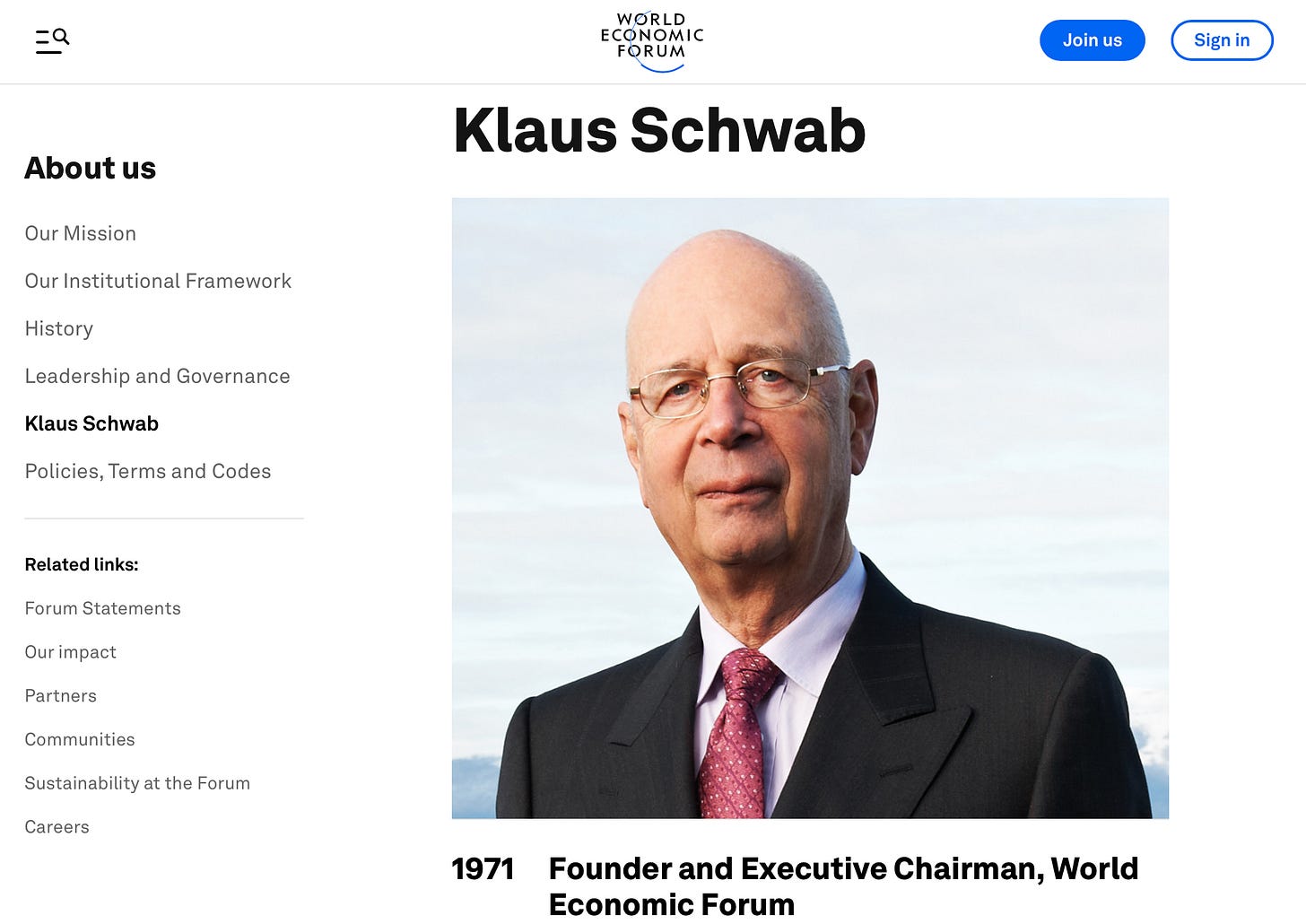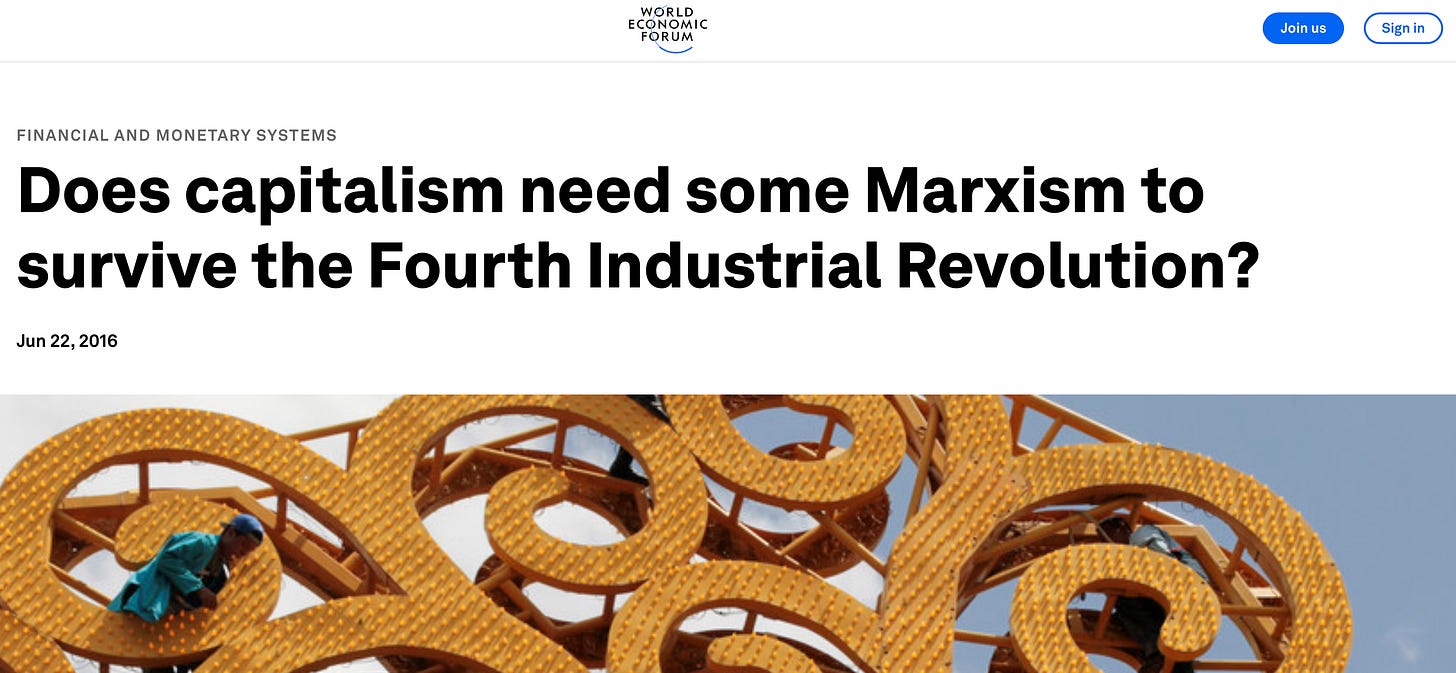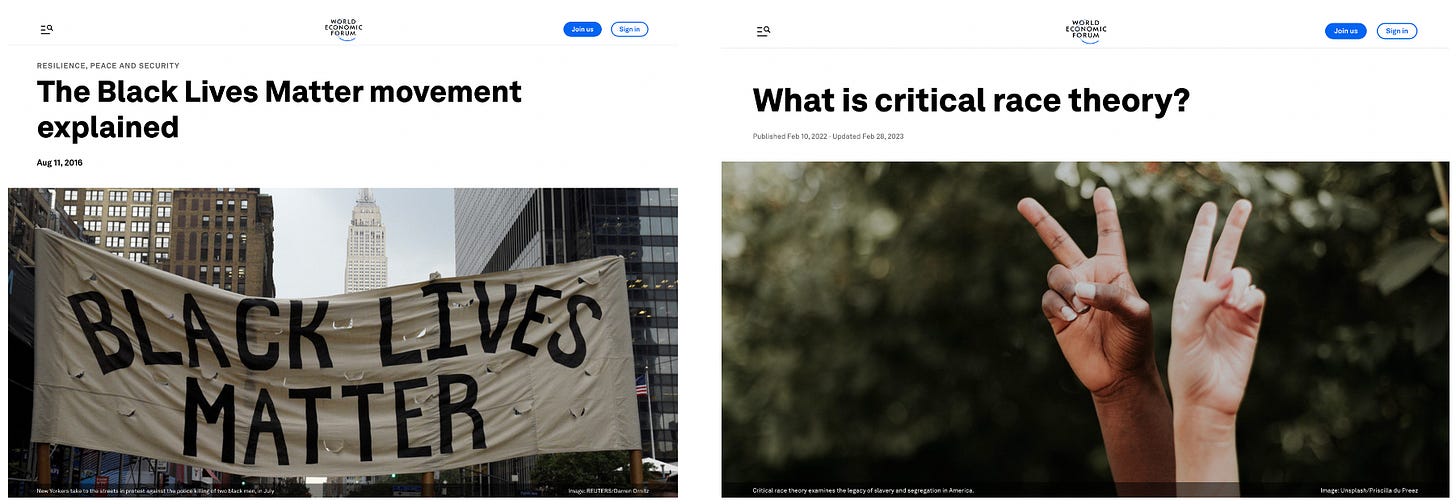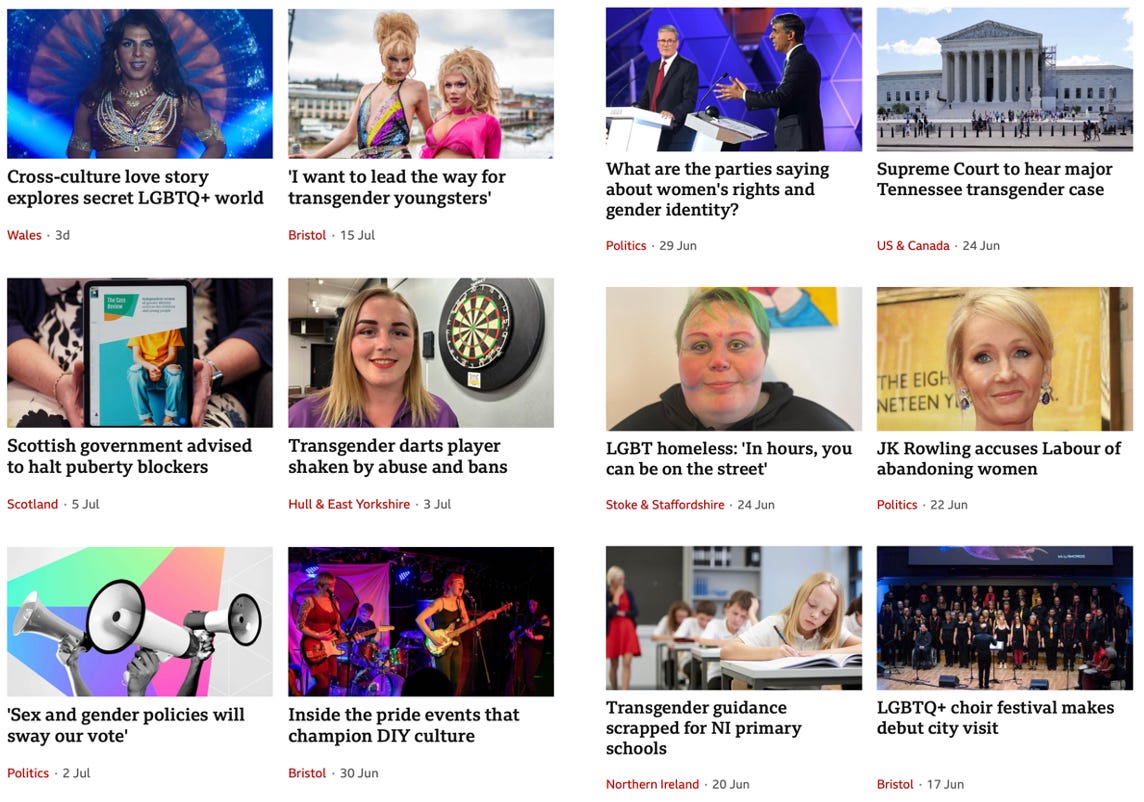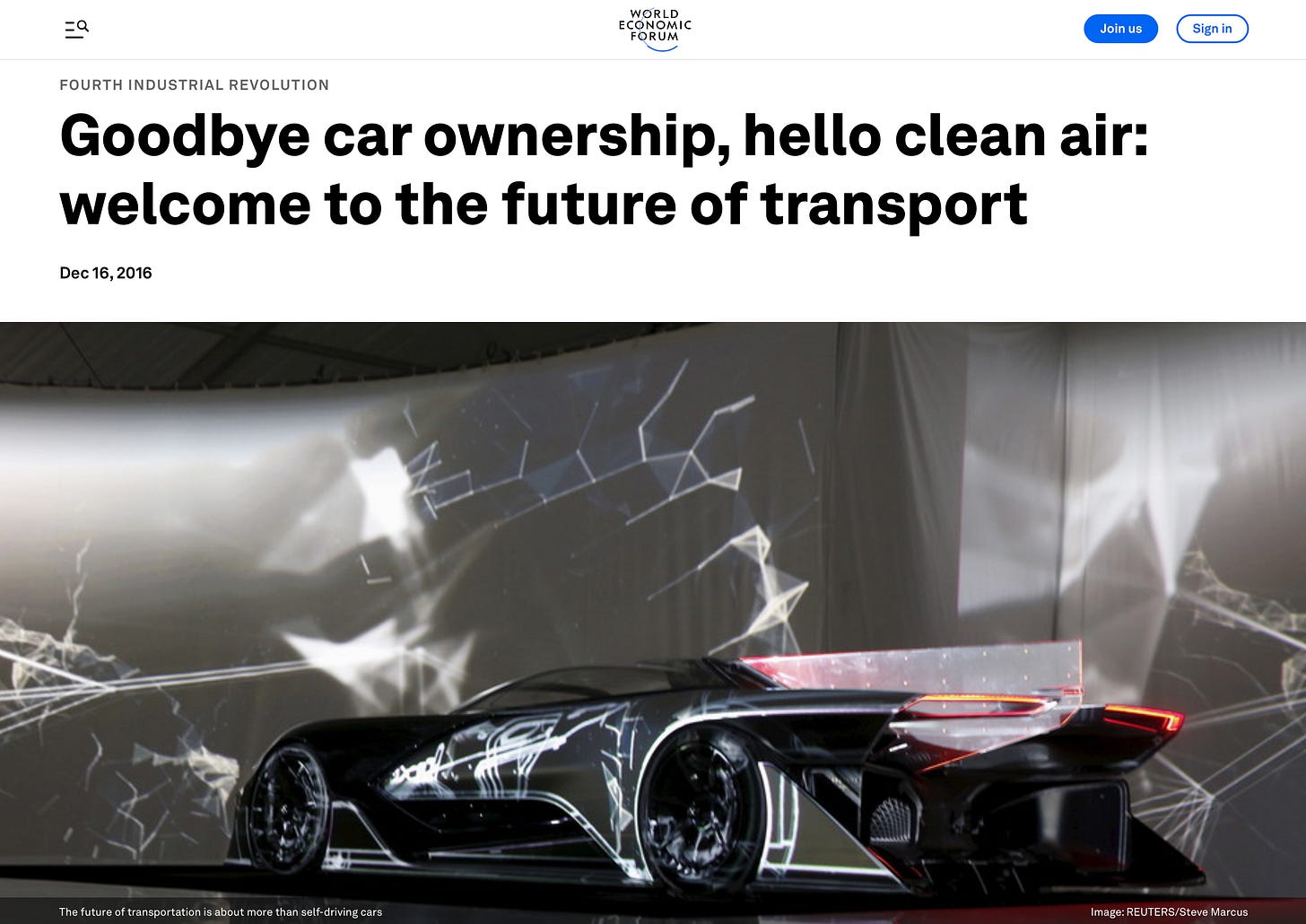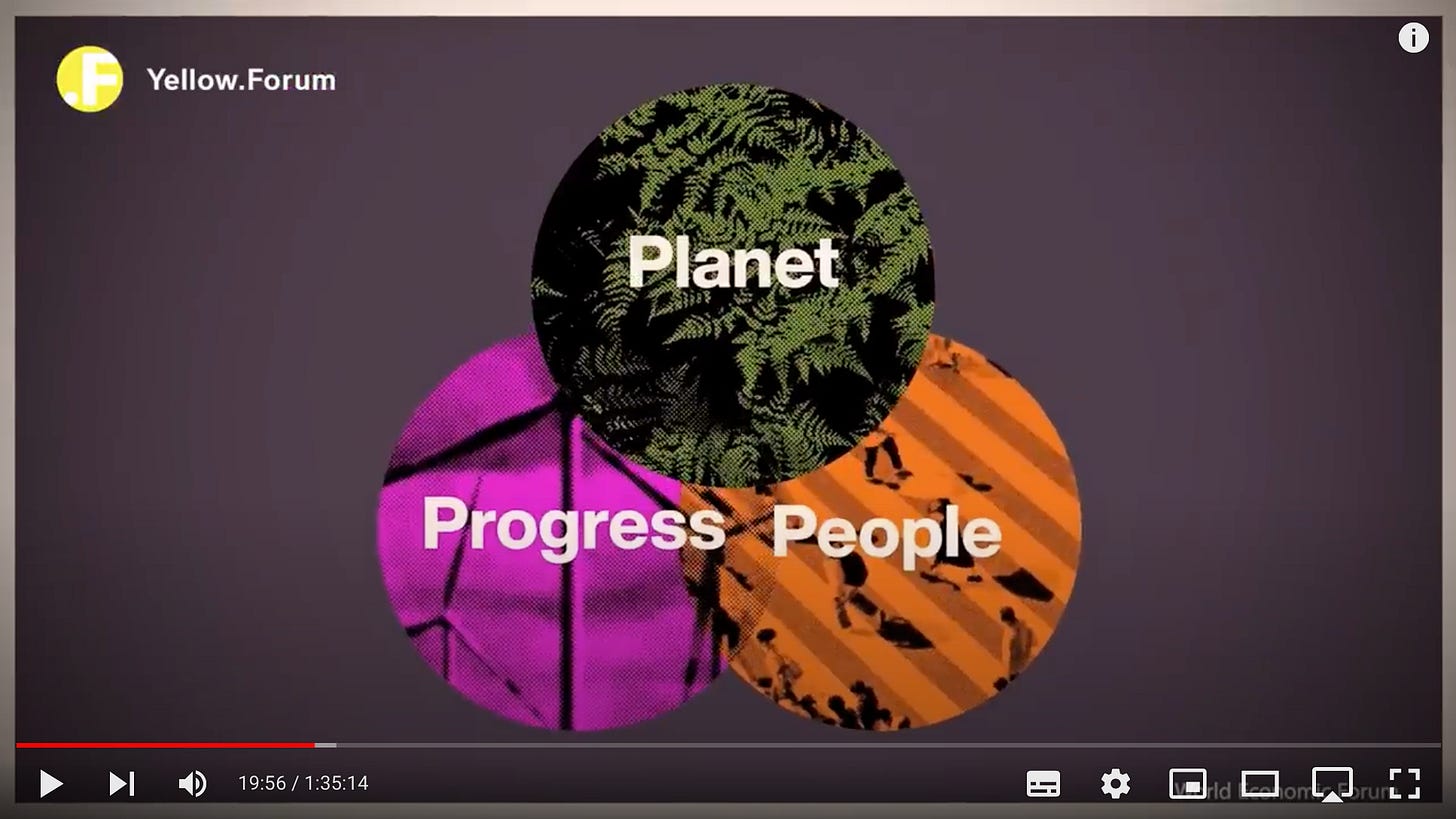Stakeholder Communism? (part 1 of 4)
Introduction; the World Economic Forum; Stakeholder Capitalism; and an “equitable, inclusive and sustainable approach”
Dear Church Leaders (and everyone else)
This is the first part of a four-part article following up this post…
…featuring the documentary Stakeholder Communism, available here.
The film builds on the four-minute trailer featured in the previous post, and particularly the case that the powers-that-be are working to transform Western society into something like that in China.
It is important to understand that the push for such a transformation is…
not a hidden conspiracy, but something that the oligarchy is quite open about
…as explained in the documentary.
My article is something of a written version of the video accompanied by some of my own input. Taken together, the four parts may constitute the longest article that I have written. It certainly took me rather longer than I had anticipated, and I almost gave up on it.
But I think the material here is sufficiently important to make the time and effort worthwhile. And I have tried to incorporate plenty of visual content along the way.
As you read the article — or watch the video — please can I suggest two things:
Try and put to one side a common assumption
Namely that those who are most powerful and influential in the world have the interests of ordinary people at heart. I am thinking not only of governments here, but of those who influence and even control them, as discussed in this post…
The notion that those who wield real power in the world are anything like on the side of the masses is perhaps the biggest stumbling block to understanding what is currently going on. Bible phrases such as “the god of this age”,1 “the ruler of the kingdom of the air”2 and “the prince of this world”3 spring to mind.
Take time to reflect before reaching conclusions
I am mindful that I encountered a lot of the content here little by little over a period of months. And I imagine that for someone engaging for the first time with these issues, the experience might feel overwhelming. I took the decision to split this article into four parts in that context.
This post features the first 20 minutes or so of the video.
Introduction
G20 governments are discreetly transitioning us to another political system called stakeholder capitalism. Like the Chinese state capitalism system, stakeholder capitalism places restrictions on the way we run our companies by forcing us to put the interests of a group of stakeholders first.
The World Economic Forum
The World Economic Forum (WEF) was established in 1971, and has until recently been fronted by its Founder and Executive Chairman Klaus Schwab, a German economist.
The WEF is an exclusive organisation that includes many of the world’s most influential people. According to Schwab, its members are:
CEOs of multinational companies
Leaders of international organisations and governments
People selected from civil society
The leaders include the heads of state from all G20 countries. The people selected from civil society include many who are influential in the mainstream media.
The WEF was launched with a long-term mission to transition the world to another political system called stakeholder capitalism.
But despite the fact that representatives of our governments and the mainstream media are partners of the WEF, we do not hear much about the transition.
And when I hear that phrase — “stakeholder capitalism” — I can’t help but recall how socialist National Socialism (Nazism) was. And how Democratic the German Democratic Republic was.
But in any case, according to Schwab:
…stakeholder capitalism is [in the 2020s] finally becoming mainstream
Stakeholder Capitalism
In his blog and book (published in 2021)…
…Schwab presents stakeholder capitalism as a blend of:
shareholder capitalism (as practised in the West)
state capitalism (as practised in China)
And makes the case that:
we should move to a system of “stakeholder capitalism”
But in practice, stakeholder capitalism primarily shows characteristics of state capitalism. i.e. the Chinese system.
Though instead of the state taking control, stakeholder capitalism provides authority to a conglomerate of WEF members drawn from:
governments — of countries, states, and local communities
civil society — from unions to NGOs, from schools and universities to action groups
companies — i.e. the private sector, whether freelancers or large multinational companies
the international community — consisting of international organisations such as the UN as well as regional organisations such as the European Union or ASEAN
The WEF has a large operation in China.
And Schwab makes no secret of his admiration for the Communist system:
I respect China’s achievements which are tremendous over the last… 40 years. I think it’s a role model for many countries. The Chinese model is certainly a very attractive model for quite a number of countries.
Curiously, the link to this WEF web page (found e.g. in a list here) featured in the documentary…
…no longer works…4
…but it has been archived on the Wayback Machine.
An “equitable, inclusive and sustainable approach”
Introduction
The WEF advocates an equitable, inclusive and sustainable approach:
And it has been pushing “inclusiveness” — empowering people who are allegedly “oppressed” — for some time…
…although the pace seemed to pick up in the covid era:
There are plenty more where those came from:
But irrespective of whether “inclusiveness” is a good thing or not, there is some important historical context.
“Inclusiveness” and propaganda
Inclusive propaganda was the primary weapon used in China’s Cultural Revolution (1966-1976) — “a sociopolitical movement in China that began in 1966 with Mao Zedong, then the leader of the Chinese Communist Party, denouncing the old capitalistic and traditional ways of Chinese life.”
Mao indoctrinated young working-class Chinese to believe they were oppressed by the capitalists, and encouraged them to rise up and overturn capitalism in favour of Communism — a “more inclusive” system.
The documentary features testimony from those who grew up in China during that time:
I just want to let the American people know that what’s going on in our school and in our country is really a replay of the Cultural Revolution in China… I want people to see there are similarities and [that the] similarities are terrifying
The WEF has been quite open about the need for Marxism:
But there is a difference between what was done in 20th century China and what the WEF is doing now. Instead of targeting the working class, Schwab and his “stakeholders” (including the mainstream media) are indoctrinating the younger generation to believe that minority groups are oppressed by our capitalist system in terms of race, sexuality and gender.
I am reminded of BBC News website articles such as these — from the last six weeks or so at the time of writing…
And the results of a DuckDuckGo search for “transgender BBC” (there are pages and pages like this):
The indoctrination now starts very early:
Here are the results of a search for “drag queens uk schools”:
“Sustainability” and the “climate crisis”
According Schwab, the way forward is:
Decarbonisation of the economy, to protect us against… “an environmental virus”
Hence WEF articles like this one:
I am reminded of this graphic from the UK Government funded FIRES project (more discussion here)…
…featured in this pair of articles on the strategy of “Problem, Reaction, Solution”:
And of the promotion of Greta Thunberg, a child being used to push the “climate crisis” narrative in emotionally manipulative manner:
“I want you to panic. I want you to feel the fear I feel every day.”
She comes across very differently when she is off-script though…
…and the whole “climate crisis” narrative, which is rarely seriously challenged in the mainstream media, looks rather dubious on closer examination.
Plus, as with covid rules, the oligarchy do not practise what they preach:
Meanwhile, the mainstream media relentlessly promotes climate alarmism, and staged stunts.
This is part of a strategy designed make the people demand a ban on fossil fuels, and the transition to another economic system — stakeholder capitalism — which is, in the colourful words of one commentator, “Communism in drag”, rebranded and sold under the banner of People, Planet and Progress.
To be continued…
[Update: Link to part 2]
Dear Church Leaders Archive; some posts, including a version of this one, can also be found on Unexpected Turns
The Big Reveal — Christianity carefully considered
Although the analogous link related to Japan does still work






